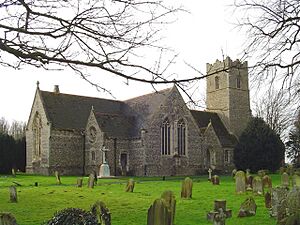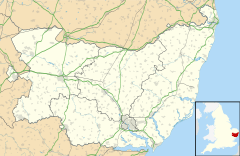Leiston facts for kids
Quick facts for kids Leiston |
|
|---|---|
| Town | |
 St Margaret’s Church |
|
| Population | 5,508 (2011 Census) |
| OS grid reference | TM445623 |
| Civil parish |
|
| District |
|
| Shire county | |
| Region | |
| Country | England |
| Sovereign state | United Kingdom |
| Post town | LEISTON |
| Postcode district | IP16 |
| Dialling code | 01728 |
| Police | Suffolk |
| Fire | Suffolk |
| Ambulance | East of England |
| EU Parliament | East of England |
| UK Parliament |
|
Leiston (pronounced LAY-stən) is a town and civil parish in the East Suffolk area of Suffolk, England. It is located near Saxmundham and Aldeburgh. Leiston is about 21 miles (34 km) north-east of Ipswich and 90 miles (145 km) north-east of London. In 2011, the town had a population of 5,508 people.
Contents
Leiston's Story: A Look Back in Time
The old remains of Leiston Abbey from the 1300s can be found north-west of the town.
Leiston's Industrial Past
Leiston grew a lot in the late 1800s and early 1900s. It was a busy town known for making things. A big company called Richard Garrett & Sons owned Leiston Works. This factory was famous for having the world's first flow assembly line. This special way of working helped them build portable steam engines faster. The company also made steam tractors and many other metal products. During both world wars, they even made munitions (military supplies).
The factory closed in 1981. Now, the area has houses, flats, and other businesses. You can still visit The Long Shop Museum to learn about the factory's history, see its old machines, and learn about the products it made.
Summerhill School: A Different Way to Learn
In 1927, a special school called Summerhill School moved to Leiston. It was started by A. S. Neill. This was one of the first "free schools." This means children have a lot of freedom in their education. For example, students are not forced to go to classes. Also, the students help make the rules and decide on punishments in special meetings. Summerhill has inspired many other "free schools" and "democratic schools" around the world. The school is located in what used to be the home of Richard Garrett, the factory owner.
Leiston and World War II
During the Second World War, there was an air base called RAF Leiston about 1 mile (1.6 km) north-west of the town. American fighter planes from the 357th Fighter Group flew from here to fight against the German air force (the Luftwaffe). A famous American test pilot and fighter ace, General Chuck Yeager, flew from RAF Leiston. He was later the first person to break the sound barrier.
Every year in May, the Friends of Leiston Airfield hold a special event. It includes a memorial service and a flying display. Veterans (people who served in the war) and their families often attend.
Famous People from Leiston
Many interesting people have connections to Leiston:
- Ranulf de Glanvill (died 1190) was a very important judge in England. He started Leiston Abbey in 1183.
- Richard Garrett (1755–1839) founded the big engineering company, Richard Garrett and Sons, in Leiston.
- Edward Buckton Lamb (1806–1869) was an architect who designed St Margaret's Church in Leiston.
- Newson Garrett (1812–1893) was born in Leiston. He built a malting business. His old buildings were later turned into the Snape Maltings concert hall.
- A. S. Neill (1883–1973) was a Scottish teacher who started the unique Summerhill School. He moved it to Leiston in 1927.
- M. E. Aldrich Rope (1891–1988) was born and died in Leiston. She was an artist who made beautiful stained-glass windows.
- Paxton Chadwick (1903–1961) was an artist and illustrator. He taught at Summerhill and was the leader of Leiston Town Council.
- Ryan Meikle (born 1996) is a professional darts player.
How Leiston is Governed
Leiston has an area called an electoral ward. This is a local area used for elections. In 2011, this ward had 6,360 people.
In 1895, Leiston became an "urban district" called Leiston cum Sizewell. This was a type of local government area. It became part of the larger East Suffolk county in 1889. In 1974, this district was changed. Leiston then became part of Suffolk Coastal. In 2019, Leiston became part of the new East Suffolk district.
Leiston's Economy and Community Life
Local Businesses
After Garrett's factory closed, Leiston's economy mostly depended on the Sizewell nuclear power stations. These are two large power stations on the coast at Sizewell. Sizewell A is no longer used, but Sizewell B is a modern power station that makes a lot of electricity.
Also, large offshore wind farms (Greater Gabbard and Galloper) connect to the Leiston substation. All these power sources send electricity to the main power grid in Great Britain.
Many smaller companies also operate in industrial areas within the town.
Leiston's High Street is the main place for shops and services. It serves the local farming area. The town has a post office, library, banks, pubs, and many different shops.
Getting Around: Transport in Leiston
There used to be a railway line that went from Saxmundham to Aldeburgh, stopping at Leiston. However, passenger trains stopped running to Leiston in 1966. The railway line to Leiston is still used today. It helps move nuclear materials from the Sizewell power station.
Leiston also has bus services that connect it directly to Ipswich, Saxmundham, Aldeburgh, Thorpeness, and Halesworth.
Culture and Entertainment
The Leiston Film Theatre is a special building. It is the oldest cinema in Suffolk that was built just for showing movies. The town council owns and runs the cinema. A support club helps raise money for things like stage improvements and new digital projection systems.
Leiston has a traditional Anglican church called St Margaret's. It has an old tower and a unique main part (nave) built in the 1800s. There are also Roman Catholic and Baptist churches nearby.
Sports and Fun Activities
Leiston has a football club called Leiston F.C.. As of the 2023–24 season, they play in the Southern League Premier Central. In 2008, the team reached the first round of the FA Cup for the first time.
The town also has a leisure centre, a skate park, and several other parks for recreation.
A rugby club, Leiston and Thorpeness Rugby Club, existed in the late 1980s and early 1990s. It closed in 1995 but was restarted in 2010 as Aldeburgh and Thorpeness Rugby Club. Many of the old members joined the new club.
Local News and Media
You can get local news and TV shows from BBC East and ITV Anglia. Television signals come from the Tacolneston transmitting station and a local relay in Aldeburgh.
Local radio stations include BBC Radio Suffolk, Heart East, Greatest Hits Radio Ipswich & Suffolk, and Alde and Blyth Community Radio (ABC).
The town's local newspaper is the East Anglian Daily Times.
Schools in Leiston
Besides Summerhill School, Leiston also has regular primary and secondary schools.
Leiston Primary School is for students aged 5 to 11. It also has a nursery for younger children.
Alde Valley Academy is a secondary school. It used to be called Leiston Community High School. In 2012, it changed its name to Alde Valley School and started taking students from age 11. In 2015, it became an "academy," which means it gets funding directly from the government.
In 2001, the school became a "Specialist Technology College." This meant it focused more on technology. In later years, it was named one of the most improved schools in England. It also worked closely with the Sizewell nuclear power stations.
See also
 In Spanish: Leiston para niños
In Spanish: Leiston para niños


